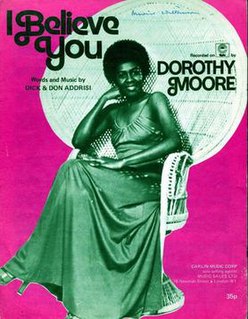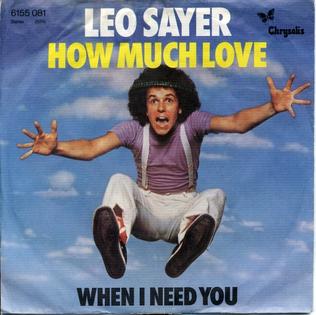
"You're All I Need to Get By" is a song recorded by the American R&B/soul duo Marvin Gaye and Tammi Terrell and released on Motown Records' Tamla label in 1968. It was the basis for the 1995 single "I'll Be There for You/You're All I Need to Get By" from Method Man and Mary J. Blige.

"Abraham, Martin and John" is a 1968 song written by Dick Holler. It was first recorded by Dion, in a version that was a substantial North American chart hit in 1968/69. Near-simultaneous cover versions by Smokey Robinson and the Miracles and Moms Mabley also charted in the U.S. in 1969, and a 1969 version by Marvin Gaye was the hit version in the U.K. It was also a hit as part of a medley for Tom Clay in 1971, and has subsequently been recorded by many other artists.

"Didn't I " is a song co-written by record producer Thom Bell and William Hart, lead singer of the American R&B/Soul vocal group the Delfonics. It was released by the group in 1969 on the Philly Groove record label and is regarded as a classic, winning a Grammy Award for Best R&B Vocal Performance by a Duo or Group.

"(Your Love Keeps Lifting Me) Higher and Higher" is an R&B song written by Gary Jackson, Raynard Miner, and Carl Smith. It was recorded by Jackie Wilson for his album Higher and Higher (1967), produced by Carl Davis, and became a Top 10 pop and number one R&B hit.

"Montego Bay" is a song co-written and performed by Bobby Bloom about the city in Jamaica of the same name. The song was a Top 10 hit for Bloom in the Fall of 1970 on both sides of the Atlantic. It reached #3 on the UK Singles Chart, #5 on the Canadian RPM 100 Singles Chart, #7 on the Australian Go-Set Singles Chart and #8 on the US Billboard Hot 100. The song was co-written and produced by Jeff Barry. In the master tape of the song, Bloom breaks into a chorus of "Oh, What a Beautiful Mornin'" at the end of the recording. The song features a whistler, as well as Jamaican instruments in a calypso style.

"This Guy's in Love with You" is a song written by Burt Bacharach and Hal David, and recorded by Herb Alpert. Although known primarily for his trumpet playing as the leader of the Tijuana Brass, Alpert sang lead vocals on this solo recording, arranged by Bacharach. An earlier recording of the song was by British singer Danny Williams titled "That Guy's in Love", which appears on his 1968 self-titled album.

"Tell It to the Rain" is a song composed by Mike Petrillo and Chubby Cifelli and popularized by The Four Seasons in 1966 and early 1967. The single reached the #10 position on the Billboard Hot 100 singles chart.

"Take Me in Your Arms " is a song written by the premier Motown songwriting/production team of the 1960s Holland–Dozier–Holland. The first hit recording was sung by Kim Weston in 1965. It was most popular in 1975 when it was recorded by the Doobie Brothers.

"I Believe You" is a love ballad composed by Don and Dick Addrisi which was a 1977 single for Dorothy Moore; taken from her self-titled Dorothy Moore album. "I Believe You" reached #5 R&B and crossed over to the US Pop Top 30 at number 27. The track also reached number 20 in the UK.

"You Made Me Believe in Magic" is the title of a 1977 international hit single by the Bay City Rollers, taken from their album It's a Game. The recording, a mid-tempo disco-styled pop tune featuring strings and horns, had its greatest impact in North America, where it was issued as the album's lead single in May 1977 to reach number 10 on the US Hot 100 in Billboard magazine that August. "You Made Me Believe in Magic" was the Bay City Rollers' third US Top 10 hit; the follow-up single "The Way I Feel Tonight" (#25) would mark the group's final Hot 100 appearance.

"My Angel Baby" is a 1978 song by Toby Beau. "My Angel Baby" was written by band members Danny McKenna and Balde Silva. The single, from the group's self-titled album, went to number one on the Easy Listening chart for one week, and peaked at number 13 on the Billboard Hot 100. "My Angel Baby" was the group's only Top 40 single.

"Swearin' to God" is a song written by Bob Crewe and Denny Randell. It was recorded by Frankie Valli and released in May 1975 as a single from his album Closeup. It is a love song whose lyrical hook is a more literal use of the expression "I swear to God" :

"Gypsy Woman" is a 1961 rhythm and blues song written by Curtis Mayfield and recorded by his group the Impressions. The group's first single following the departure of lead singer Jerry Butler, it reached No. 2 on the US Billboard R&B chart, No. 20 on the Billboard Hot 100 and number 17 on the Cash Box chart. It also appeared on the group's 1963 eponymous debut album.

"How Much Love" is a popular song from 1977 by the British singer Leo Sayer. It was the third of three single releases from Sayer's 1976 album, Endless Flight. The song was co-written by Sayer with Barry Mann.

"Stormy" is a hit song by the Classics IV released on their LP Mamas and Papas/Soul Train in 1968. It entered Billboard Magazine October 26, 1968, peaking at #5 on the U.S. Billboard Hot 100 chart and #26 Easy Listening. The final line of the chorus has the singer pleading to the girl: "Bring back that sunny day". This single release along with the prior release of "Spooky", and soon afterward the release of "Traces", made great success for the band, a part of the well-known songs from the ensemble.

"Love in the Shadows" is an uptempo pop song written and recorded by Neil Sedaka. The song became an international Top 20 hit in 1976.

"You'll Never Get to Heaven " is a song composed by Burt Bacharach, with lyrics by Hal David. It was originally recorded by Dionne Warwick in 1964, who charted at number 34 in the US Billboard Hot 100 with her version. It was covered by the Stylistics in 1973, who reached number 23 in the US with their cover.

"My Uncle Used to Love Me But She Died" is a 1966 song by Roger Miller. It was the fourth of four singles released from Miller's fourth LP, Words and Music, all of which became U.S. Top 40 Country hits.

"You Came, You Saw, You Conquered!" is a 1969 song by The Ronettes. It was their final charting U.S. hit, reaching #108 Billboard and #92 Cash Box. In Canada, the song peaked at #73 for two weeks. It was the first of a series of non-album single releases by the group.

"Up in a Puff of Smoke" is a song recorded in 1974 by Polly Brown, released as a non-album single to become an international Top 40 hit in 1975.




















